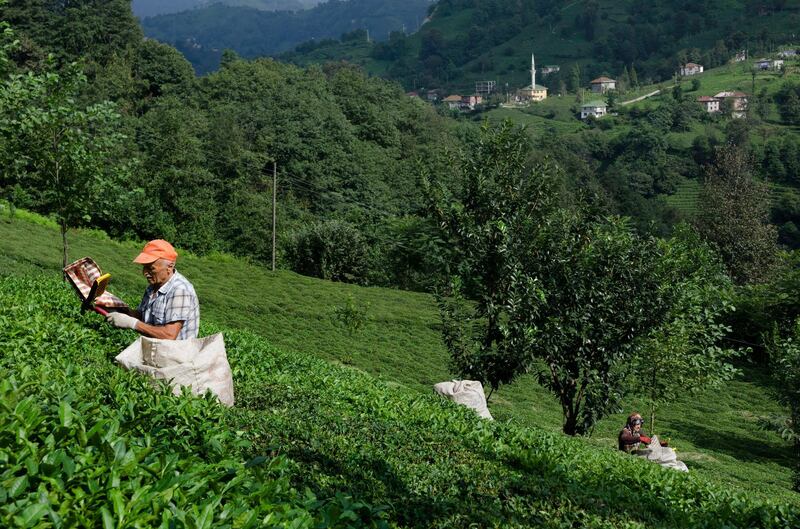Few social interactions take place in Turkey without the accompaniment of a glass or two of tea, a fondness that makes Turks the world’s biggest drinkers of the brew.
However, the country’s tea-growing industry, centred on the slopes running down to the Black Sea, faces disruption to the first harvest of the year this month from the coronavirus pandemic.
Plantations in the northeastern provinces of Rize, Trabzon, Artvin and Giresun produce around 260,000 tonnes of tea annually, most of it sold domestically to slake the thirst of Turks who each consume an average of 3.5 kilos of tea every year.
Like much of the Turkish economy, tea producers are fighting to cope with the downturn caused by the outbreak, which hit Turkey as it was struggling to recover from a recession last year that followed a currency crisis in 2018.

However, the sector has come under added pressure due to restrictions that mean seasonal tea pickers will not be able to travel to harvest the crop.
Every year tens of thousands of casual workers flock to the Black Sea, many from neighbouring Georgia and Azerbaijan, but also from other parts of Turkey. Their absence means tea producers face the prospect of a large part of the crop lying unpicked.
In addition, some 50,000 tea farmers were unable to prepare their fields for the harvest, according to Fatma Genc, a researcher at Istanbul’s Marmara University who studies the Turkish tea industry.
“Tea cultivation cannot be carried out under these conditions and this year will go down in history as a year of loss and damage in terms of the harvest,” she said.
“Apparently, the government of Turkey has given up on tea production, tea producers have been abandoned to their fate.”
Across the Black Sea region, some 1.2 million farmers, factory workers, traders and their families make their livelihood from the tea industry.
Rize, where President Recep Tayyip Erdogan’s family has its roots, has been the centre of the industry since the 1920s.
It is also a staunch heartland for Mr Erdogan’s Justice and Development Party (AKP), casting the highest share of votes – 72 per cent – for the ruling party’s candidate of any of Turkey’s 81 provinces in last year’s local elections.
One of the province’s leading employers is Caykur, the state-owned producer that supplies around 60 per cent of Turkey’s tea. The company, which was absorbed into Turkey’s sovereign wealth fund three years ago, buys tea from some 200,000 independent farmers.
However, critics say neither the company nor the government in Ankara has done enough to safeguard the industry against the pandemic.
“We have no information that Caykur has conducted a study on this issue,” said Suleyman Hacibektasoglu, a farmer from Trabzon. “In short, there are no tangible steps taken anywhere to prepare for the season. There’s uncertainty and despair.”
Recep Memisoglu, spokesman for the Tea Farmers’ Union, also criticised the lack of action. “It’s impossible for our region not to be affected economically,” he said. “Although the people of our region mainly get their income from tea, all kinds of tradesmen will be affected by the disruption.
“How will the tradesman pay his taxes, his rent, his loan, how will he make ends meet? Central government has to do something but the chain of errors continues.”
Even before the arrival of coronavirus, Caykur faced problems. It reported losses of 1.5 billion liras (Dh738 million) over the last three years and debts of 3.5 billion liras (Dh1.8 billion).
Without support from Ankara, local authorities have developed schemes to save as much of the crop as possible.
Ercument Sahin Cervatoglu, town mayor of Findikli in Rize, said the council had hired locals to harvest around half the 30,000 tonnes that would usually be picked during three harvests between May and September.
“We will first meet their insurance and wages for a period of six months,” he said. “Within these six months, they will work on the tea harvest and, during the quiet times, they will be employed by the Chamber of Agriculture and on municipal projects.
“In this way, both the problem of tea producers will be solved and it will be an important development for the employment of people living here.”
Yusuf Ziya Alim, Caykur’s deputy general manager and a former AKP electoral candidate, said the company had implemented a 44-point plan to protect workers and the harvest. “Our greatest wish is that the threat of epidemic disease disappears as soon as possible and people return to their normal lives,” he said.
Having faced a 70 per cent rise in tea prices over the last five years, the blow to the industry is likely to further increase the cost of Turks’ daily brew.
“The failure to harvest this year will make it difficult to meet even domestic demand,” said Ms Genc. “Tea prices, which have been hiked twice in a row this year, will increase even more if the producer cannot go to the field.”







